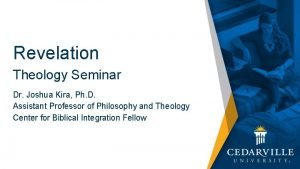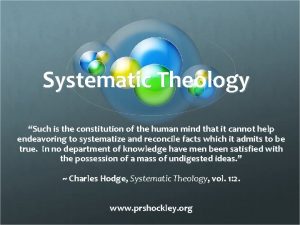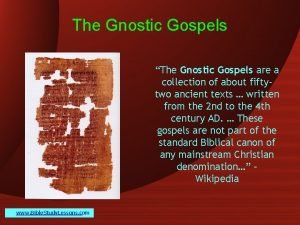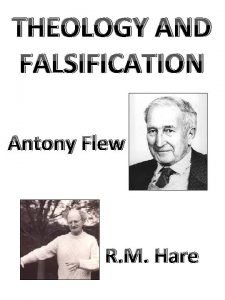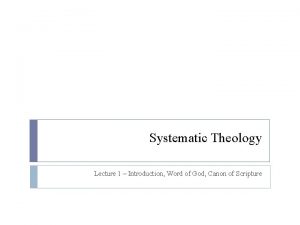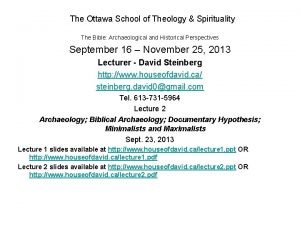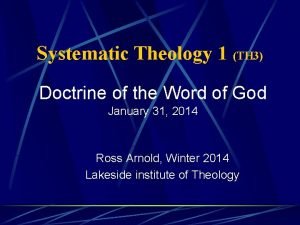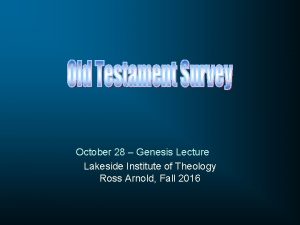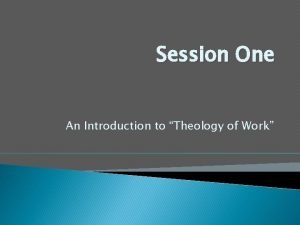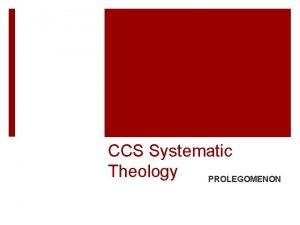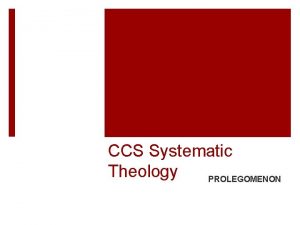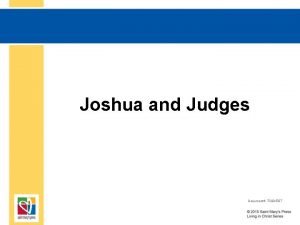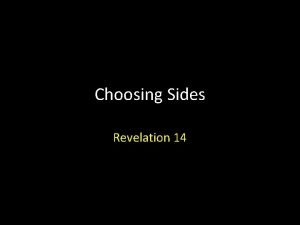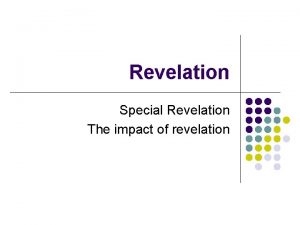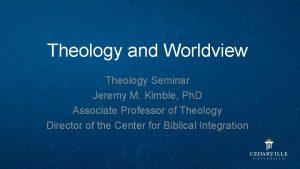Revelation Theology Seminar Dr Joshua Kira Ph D

























- Slides: 25

Revelation Theology Seminar Dr. Joshua Kira, Ph. D. Assistant Professor of Philosophy and Theology Center for Biblical Integration Fellow

Revelation and Scripture • Revelation is a term that covers a large semantic range, including, but not exclusively: Showing (Gen 12: 1); manifesting (Ez 20: 41); making known (Rom 9: 22 -23); speaking (Matt 1: 22); appearing (Acts 1: 3). • The core idea is that something that is hidden is made manifest. • The agent is the one who causes the manifestation.

Distinctions in Revelation • General revelation - God’s disclosure of limited truths concerning Himself through creation and conscience, which is, in principle, available to all people at all times. • Special revelation - God’s disclosure of Himself or truths concerning Himself through special acts, such as the incarnation and Scripture, which is available to a limited number of people in particular historical situations.

Central Aspects of Revelation • Revelation is a theological term that recognizes: • God is not known like other things. • God is gracious in being known.

God Is Not Known Like Other Things • What is the doxastic practice that is fitting for God? • God is not physical like we are (John 4: 24). • God is not historical like we are (Ps 102: 25 -27; 2 Pe 3: 8). • God is not present like we are (1 Ki 8: 27 -29; Ps 139: 7 -12). • God is not similar to other things (Ex 15: 11 -12).

God Is Not Known Like Other Things • God is hidden to our unaided faculties. • Job 11: 7 -8 - “Can you find out the deep things of God? Can you find out the limit of the Almighty? 8 It is higher than heaven—what can you do? Deeper than Sheol—what can you know? ” • Rom 11: 33 - “ 33 Oh, the depth of the riches and wisdom and knowledge of God! How unsearchable are his judgments and how inscrutable his ways!”

God Is Not Known Like Other Things • God is knowable and meant to be known. • John 17: 3 - “And this is eternal life, that they know you the only true God, and Jesus Christ whom you have sent. ” • 1 John 5: 20 - “ 20 And we know that the Son of God has come and has given us understanding, so that we may know him who is true; and we are in him who is true, in his Son Jesus Christ. He is the true God and eternal life. ”

God Is Not Known Like Other Things 1. God is hidden to our unaided faculties. 2. God is knowable and to be known. ∴ Only God is qualified to reveal Himself.

God Is Gracious in Being Known • Whereas the agent in seeking, solving, or proving God is the human, the agent in revelation is God. Since revelation is God’s work: • He alone is to receive credit for it. • God is gracious in providing it for us.

“The theological category of revelation is a radical attempt to concentrate everything that we can know about God in and on God alone: God is the sole authority in matters of faith because he is the sole author, content, revealer, communicator, and interpreter of himself: solus deus (God alone). ” – Ingolf Dalferth, CGU Philosophy of Religion Conference

God Is Gracious in Being Known Ordo Essendi - The Father reveals Himself in the Son, who reveals Himself in the Spirit. Ordo Cognoscendi - The Spirit reveals that the Son reveals the Father.

God Is Gracious in Being Known For the Reformers, revelation begins as an assumption that they shared along with the Scholastics. However, as the movement pushed forward, revelation began to be intertwined with other doctrinal concerns such that it becomes more central to the overall systematic consistency of the five traditional solae.

Categories Of Revelation • The greatest emphases, when speaking of general and special revelation, have been placed on the following: • General revelation. • Special revelation. • Nature. • Jesus Christ. • Conscience. • Scripture.

“Hence it was necessary for the salvation of man that certain truths which exceed human reason should be made known to him by divine revelation. Even as regards those truths about God which human reason could have discovered, it was necessary that man should be taught by a divine revelation; because the truth about God such as reason could discover, would only be known by a few, and that after a long time, and with the admixture of many errors. ” –Thomas Aquinas, Summa Theologica, Prima Pars, Q. 1, Art. 1, Resp.

Significance of Special Revelation • Significance of Special Revelation. • Only way to salvation. • Only way to the Christian God. • Only way to deal with human finitude and sinfulness. • Only way to interpret the historical actions of God.

“But what the claim that revelation is essentially verbal does imply is that no historical event, as such, can make God known to anyone unless God Himself discloses its meaning and place in His plan. . No event is self-interpreting at this level. . God’s revelation is not through deeds without words (a dumb charade!) any more than it is through words without deeds; but it is through deeds which He speaks to interpret, or putting it more biblically, through words which His deeds confirm and fulfill. The fact we must face is that if there is no verbal revelation, there is no revelation at all, not even in the life, death, and resurrection of Jesus of Nazareth. ” J. I. Packer, God Speaks to Man, 51 -52

Significance of Special Revelation • The textual nature of Scripture is what allows believers to understand God’s own interpretation of Himself, His actions, and His world. • For this reason, the authoritative source of theology comes from God’s special revelation in Scripture. • Scripture gains trustworthiness and authority from its source.

Implications of Special Revelation • Scripture, consequently, should be understood as: • Authoritative in any area to which it speaks. • Sufficient to do what it claims to do. • Inerrant in all that it says, even beyond faith and practice.

Significance of Special Revelation • Revelation allows one to know God, not just to know about God. • Types of revelation: • Revelation of something - 3 rd person impersonal knowledge. • Revelation of someone - 3 rd personal knowledge. • Revelation of you - 2 nd personal knowledge. • This can only occur through special revelation.

Significance of Special Revelation • Since God reveals not only who He is, but also how He relates to the world in His special revelation, Scripture becomes the foundational for the way in which Christians interpret the world. • Scripture gives us limited knowledge of the world, but what knowledge it gives should be recognized as true. • Investigating the world may lead to what is true, but the foundational truth of Scripture means that one must side with God’s Word where there is conflict.

How Revelation Affects Our Fields 1. Revelation as the basis for living as a Christian. • Teleology – Scripture specifies our purpose. • Values – Scripture supplies values that are important for how we evaluate the significance of ideas. • Priorities – Scripture orders priorities so that we can properly steward our resources. • Virtues – Scripture can show those characteristics that we should exhibit, which can affect one’s field. • Institutions – Scripture can give impetus for institutions that affect the way in which we understand our fields.

How Revelation Affects Our Fields 2. Revelation as the basis for living as a thinker. • Unity – Scripture accounts for the unity between truth, knowledge, experience, different fields, etc. • Axioms – Scripture provides the foundation for beliefs that are not based on other beliefs. • Interpretation – Scripture interprets the world in light of God. • Categories – Scripture can afford the terminology/categories through which one is to think of the world.

How Revelation Affects Our Fields 3. Revelation as the basis for living as a scholar. • Criticism – Scripture conflicts with worldly knowledge. • Content – Scripture makes claims that would be included in non -theological fields of study. • Supplementation – Scripture supplements a field with additional knowledge. • Possibilities – Scripture can begin to define what is possible for humans and their scholarly fields.

Why Non-theological Fields Matter • Worldly knowledge – We use non-theological fields to understand the world in which we are to live. • Instrumentality – We use non-theological fields when living. • Clarification – We use non-theological fields to clarify opposing and supporting perspectives. • Polemics – We use non-theological fields in arguing for and against certain beliefs and perspectives. • Illustration – We use non-theological fields to illustrate God’s activity. • Reinterpretation – We use non-theological fields to provide content which God can reinterpret in light of His work.

Summary • Since God is not known like other things, He must be known through his revelation. • Special revelation is foundational to knowing God, since only God is qualified to reveal God. • Revelation is gracious, since God is the agent and we do not deserve it. • Scripture becomes essential both for how one understands God and for how one interprets the world.
 Book of haggai
Book of haggai Formula tempoh kutipan purata
Formula tempoh kutipan purata Contoh kunci kira kira
Contoh kunci kira kira Kunci kira kira perniagaan kecil
Kunci kira kira perniagaan kecil Rambut tumbuh kira kira pada kelajuan rata rata
Rambut tumbuh kira kira pada kelajuan rata rata Ordo essendi
Ordo essendi Elenctic theology definition
Elenctic theology definition Theology of missions
Theology of missions David e pratte theology
David e pratte theology Antony flew theology and falsification
Antony flew theology and falsification Seattle university school of theology and ministry
Seattle university school of theology and ministry Mackies inconsistent triad
Mackies inconsistent triad Praxis model of contextual theology
Praxis model of contextual theology Define theology proper
Define theology proper Mike mazzalongo church
Mike mazzalongo church Theology proper lecture notes
Theology proper lecture notes Inconsistent triad
Inconsistent triad Examples of imagery in the crucible
Examples of imagery in the crucible Behold i make everything new
Behold i make everything new The crucible act 3 vocab
The crucible act 3 vocab Basil mitchell parable of the partisan
Basil mitchell parable of the partisan Ottawa school of theology and spirituality
Ottawa school of theology and spirituality 5 pillars of reformed theology
5 pillars of reformed theology What is theology
What is theology Lakeside institute of theology
Lakeside institute of theology Theology
Theology





